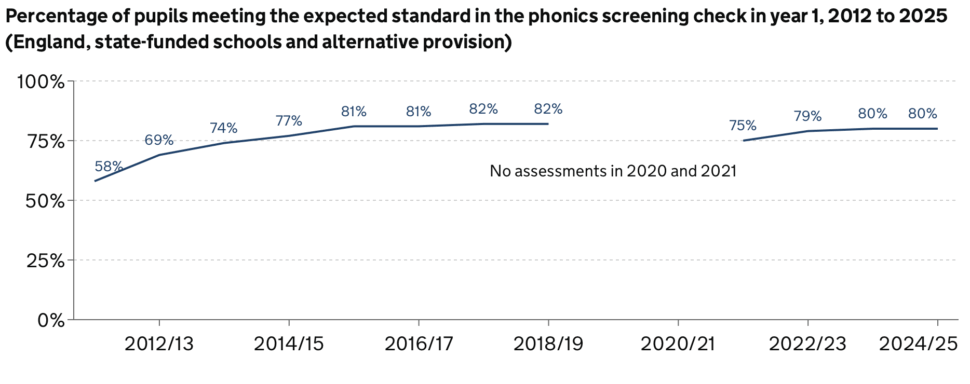The proportion of disadvantaged pupils meeting the government’s “expected standard” in their year 1 phonics screening test has fallen this year, as overall progress since the pandemic has plateaued.
Government data published today shows 67 per cent of disadvantaged pupils taking the test for the first time met the standard this year, compared with 68 per cent last year.
Overall, 80 per cent of pupils passed the test in year 1, the same figure reported last year.
Achievement rates remain below pre-pandemic levels.

Phonics tests are taken in year 1, and those who do not pass take the test again in year 2.
This year’s data shows progress to return to pre-pandemic levels has plateaued.
While achievement rates were at 82 per cent in 2018-19, this fell to 75 per cent in 2021-22. This crept up to 79 per cent in 2022-23 then 80 per cent in 2023-24.
Gaps widen
The gap between disadvantaged and non-disadvantaged pupils has widened.
For year 1 and year 2 combined, disadvantaged pupils are now 17 percentage points behind their better-off peers, up from 16 percentage points last year.
There has also been a slight drop in the proportion of boys reaching the expected standard in the test in year 1 (77 per cent to 76 per cent), which remains lower than the rate of girls meeting it, at 84 per cent.
The gap between London, which remains the highest performing region, and the north east and north west, the lowest performing regions, has also widened by four percentage points.
Eighty-two per cent of London pupils met the expected standard this year, compared to 78 per cent in the north east and north west.
SEN pupils have also seen a reduction in achievement rates, from 44 per cent last year to 43 per cent this year.
Summer-born pupils remain less likely to meet the government’s benchmark. Seventy-three per cent of pupils born in August met the standard this year, compared to 86 per cent of those born in September.








As with any data trend, I’d be asking: what else has changed? Phonics and the psc test data is only a tiny part of the bigger picture. School readiness has been in decline for a decade before covid hit. Technology useage by parents has increased and the old phase 1, securing phonological awareness, is increasingly in decline from pressure to start gpc teaching from week 2 of reception. I hope this data will not be weaponised to beat educators or hothouse children, but that the erasure of phase 1 and preparedness is looked into and supported to rectify the oversight.